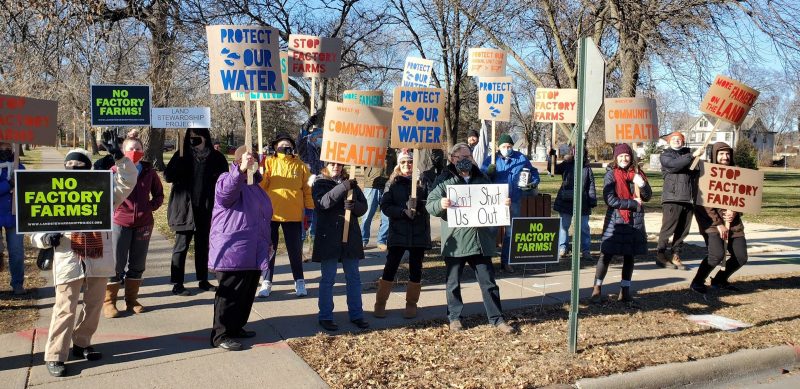
During the past two years, a dairy CAFO in Minnesota’s Winona County has made repeated attempts to force through an unprecedented expansion that could have profound negative impacts on the community. At issue is Daley Farm’s proposal to add roughly 3,000 animals to its existing operation, which would put the operation at around 6,000 animal units, almost four times the county’s animal unit cap of 1,500 animal units. That cap is equivalent to 1,071 dairy cows, 5,000 market hogs, and 1,500 beef cows/steers; the overwhelming majority of livestock operations in Winona County and across Minnesota are well below this limit, meaning this cap readily allows for a family farm-based system of livestock agriculture. Such a cap is particularly important in a region like southeastern Minnesota, where groundwater is vulnerable to contamination as a result of the porous karst geology that predominates.
However, the Daley Farm proposal is seen as a bellwether by Big Ag in Minnesota, as its supporters push a model of agriculture that leaves no room for small to medium-sized farms. As a result, immense pressure has been put on public officials to capitulate to Daley Farm’s demands and set a new standard for what kinds of dairies will dominate our communities and how the rules apply to them.
In 2021, despite widespread public opposition, Daley Farm made yet one more attempt to blow by the cap via the court system as well as Winona County’s Board of Adjustment. In both cases, the will of the people was upheld, and the CAFO’s proposal was denied.
A major reason that, despite backing from powerful interests, Daley Farm has not been successful in ignoring common sense rules is that Winona County residents have repeatedly made their voices heard. Their message is clear: exceeding the animal unit cap is not good for the land, water, family farms, or rural communities.
One way they’ve made their voices heard has been through letters-to-the-editor published in local newspapers. Below is a sampling of those letters:
-
- Oppose Daley Farm expansion, by Karen and Richard Ahrens — Nov. 28
- County Animal Caps Matter, by James Armstrong — Nov. 28
- Proposed expansion brings danger, by Wayne Ode — Nov. 28
- Big Ag is on an intimidation campaign, by Tessa Schweitzer — Nov. 27
- Feedlot cap serves purpose; variances should be modest, by Richard Dahl — Nov. 24
- Daley Farm to subject county to literacy test, by Tim Ahrens, — Nov. 10
- Factory farms threaten rural communities, by Sam Streukens — November 17
- Does Daley Farm even qualify for a permit? by Barb Nelson — September 22
- Stop the Daley Farm expansion now, by Deanne Sczepanski — September 22
- Daley Farm should conform to existing rules, by Barb Nelson — September 12
- Farm expansion is a public health issue, by Lisa Schnepper —– August 11
- Preserve water quality, keep animal unit cap on farms, by Doug Nopar — August 4
